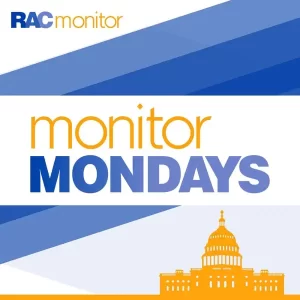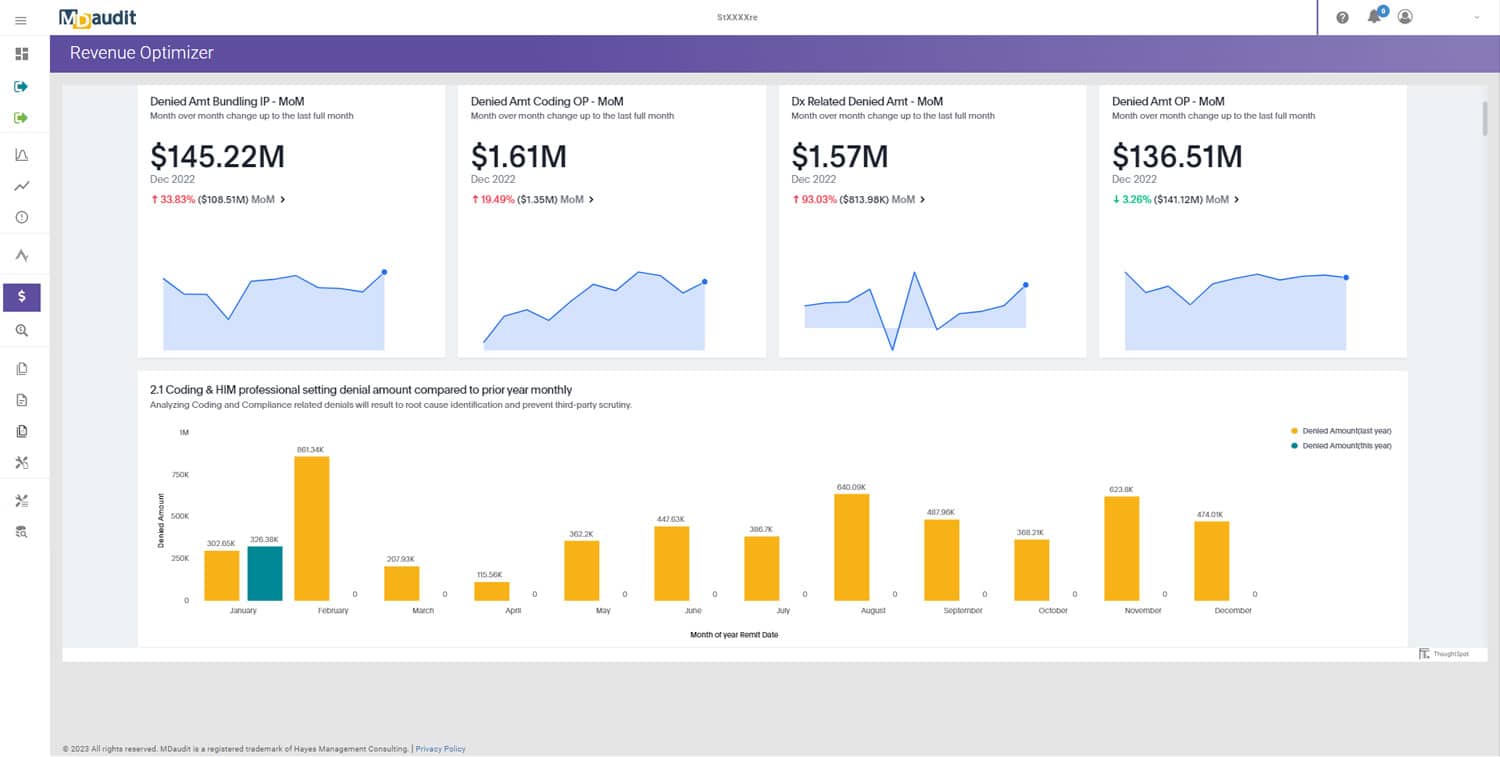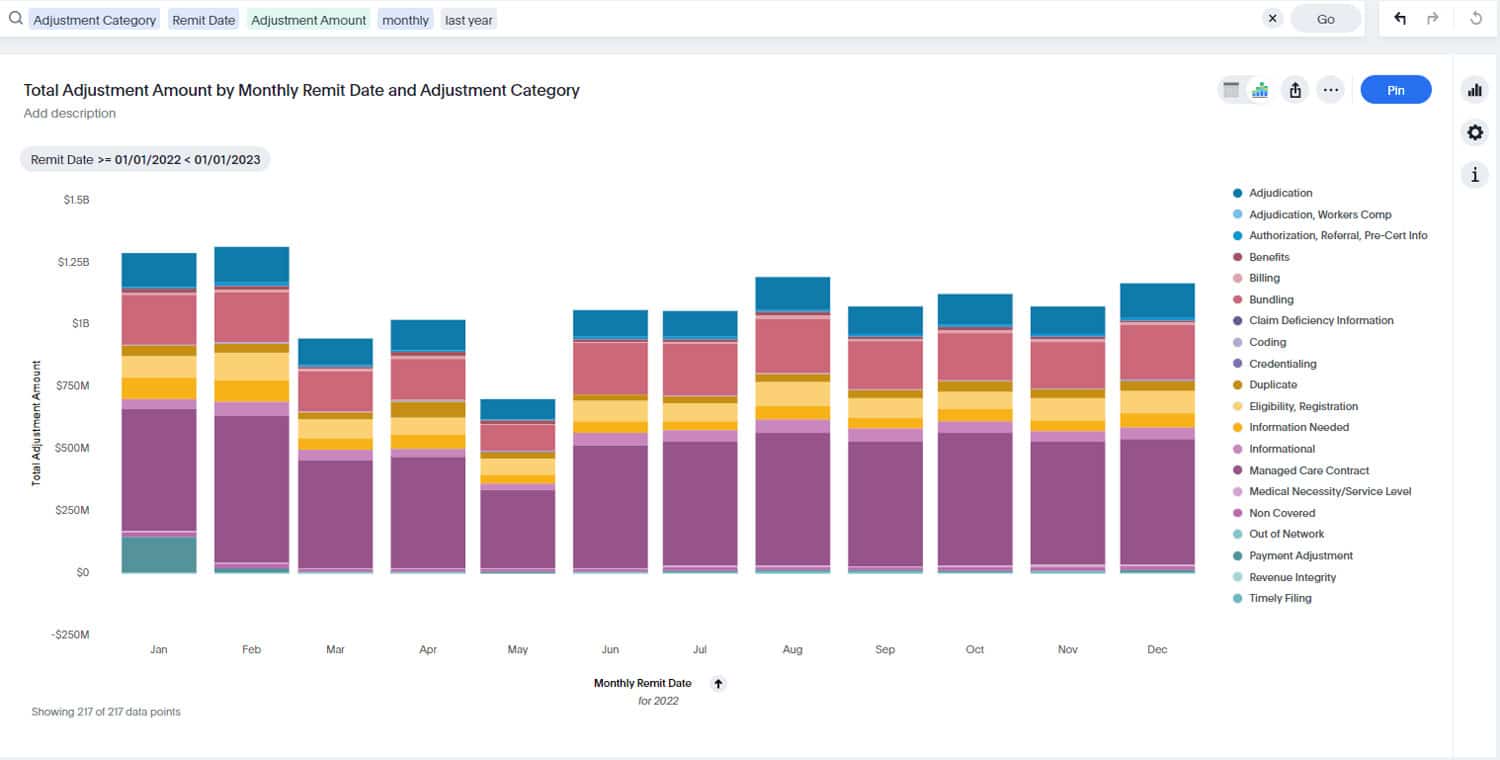Elion, an intelligence platform for health IT decision makers, included both MDaudit’s Revenue Integrity Suite and Streamline by MDaudit’s RevID on its Revenue Integrity Market Map of 14 products. This key function is critical for a healthcare system’s overall revenue cycle management.
This blog breaks down what makes both products so valuable to the market.
Why is Revenue Integrity Important?
Revenue integrity is where clinical excellence meets financial sustainability. Without it, even the best care can be undermined by lost revenue and rising risk. It ensures that the clinical work performed is accurately and compliantly captured as revenue. When gaps occur, the organization not only loses earned dollars but also exposes itself to regulatory and audit risk.
Beyond financial protection, revenue integrity serves as the connective tissue linking clinical documentation, coding, billing, and reimbursement. Its importance lies in creating a unified framework where these functions can align. By doing so, health systems move from chasing denials after the fact to proactively safeguarding revenue before it leaves the door. This shift allows leaders to focus less on recovering lost dollars and more on sustaining long-term financial health to support patient care.
Revenue Integrity Redefined
Leading revenue integrity technology platforms are redefining how this function operates within the greater revenue cycle continuum. Ritesh Ramesh, CEO of MDaudit, views revenue integrity as “a perfect playing field for risk mitigation, revenue optimization, and operational efficiency to interact.” This requires today’s revenue cycles professionals across billing compliance, coding/health information management (HIM), and revenue integrity to work in collaboration across the same shared data.
Which Functions do Revenue Integrity Teams Serve?
Traditionally, revenue integrity teams serve the following day-to-day functions:
- Chargemaster Maintenance and Management
- Charge Capture, Audits, and Edits
- Denials Management
- Billing Compliance
These teams rely on modern solutions that cover charge capture, pre-bill audits, and chargemaster management. Predominantly covering mid-cycle pain points and challenges that impact functions downstream.
MDaudit’s Revenue Integrity Suite Solutions
MDaudit’s Revenue Integrity Suite comprises three award-winning solutions that cover the span of revenue integrity functions: Denial Risks, Denials Predictor, and Payer Audit Workflow. Let’s take a closer look at each one.
Denial Risks
Denial Risks helps healthcare organizations across coding, billing, compliance, and revenue integrity departments make more informed decisions and take more effective actions to avoid risk and maximize revenue. Personnel at every level of your organization- from executives to mid-level management to line-level analysts and more – will benefit from Denial Risks’s versatility, ease of use, and depth of features.
Features like:
- Tracking Case Mix Index (CMI)
- Monitoring and Predicting Denial Trends
- Identifying Risk Areas
- Detecting Anomalies
- Tracking Hierarchical Conditional Category (HCC) Codes
Denials Predictor
MDaudit’s Denials Predictor is a pre-payment charge review engine. It augments claim scrubbers for High Specialty Drugs, Implants, and complex diagnoses across hospital and ambulatory surgical centers (ASCs). Addressing the charges that drive 80% of denial dollars that traditional claim scrubbers miss.
Denials Predictor pulls pre-payment charges (both pre-bill and non-adjudicated charges) and applies clinical and financial surveillance rules to provide final claims validation before claims submission or payment, while leveraging a powerful payer-centric rules engine based on a nationwide payer base.
Through these rule sets, the module provides an additional layer of identification for denial categories not picked up by traditional claims scrubbers, providing greater insights into the costliest sources of denials.
Payer Audit Workflow
This third-party audit management solution helps healthcare organizations manage third-party governmental and private payer audits, such as Recovery Audit Contractors (RAC), Targeted Probe and Educate (TPE), and Comprehensive Error Rate Testing (CERT) audits.
Reducing the manual effort of tracking requests, pulling records, reporting results, and staying on top of due dates is time-consuming and inefficient. Payer Audit Workflow makes it easy to manage external audit requests in a single centralized, secure platform.
Streamline by MDaudit’s RevID and eValuator
The recent acquisition of Streamline Health by MDaudit represents a strategic alignment of technology and expertise. By bringing RevID and eValuator into the same portfolio as the Revenue Integrity Suite, MDaudit has created a unified platform that addresses charge capture, coding accuracy, compliance oversight, and audit defense all in one solution.
This integration reflects the very principles of best-in-class revenue outlined in this blog:
- Visibility across the Revenue Cycle
- Proactive Risk Prevention
- Automation
- Measurable Financial Impact
eValuator: Another Valuable Revenue Integrity Tool
Although not mentioned in Elion’s product road map, Streamline by MDaudit’s eValuator is another valuable revenue integrity tool that complements the others.
Accurate coding is a cornerstone of revenue integrity. Even the smallest errors can cascade into claim denials, compliance risks, or lost reimbursement. Traditional retrospective audits often identify issues too late, after revenue has already left the door. A best-in-class solution addresses this by ensuring coding integrity in real-time, before claims are submitted.
Streamline by MDaudit’s eValuator reviews 100% of coded encounters prior to billing, applying advanced logic to identify discrepancies in MS-DRGs, CC/MCC capture, and other high-impact coding elements. Instead of relying on limited, sample-based reviews, eValuator ensures every claim is accurate before it is released. This prevents costly denials, reduces compliance exposure, and strengthens financial performance at the source. When paired with RevID and MDaudit’s Revenue Integrity Suite, eValuator completes the integrity framework.
4 Key Characteristics of a Best-in-Class Revenue Integrity Solution
1. Comprehensive Visibility Across the Revenue Cycle
A best-in-class revenue integrity strategy begins with complete visibility across the entire revenue cycle. When charge capture and compliance auditing operate in silos, blind spots emerge that lead to revenue leakage or compliance risks. Eliminating those blind spots requires technology that connects data and processes across departments.
This visibility starts with RevID. By automating the compilation and analysis of all charge data, RevID identifies discrepancies between clinical activity and billing records during daily reconciliation. In one health system, this level of automation and oversight uncovered a half-million-dollar billing error that would have otherwise gone undetected. The ability to surface such discrepancies in real-time highlights how RevID not only reduces staff burden but also directly safeguards significant revenue.
That visibility is then extended by Revenue Integrity Suite. With Denial Risks, healthcare organizations gain full visibility into systemic hotspots across facilities and specialties within the organization. These hotspots are identified based on the ingestion of remittance data. Denial Risks works in conjunction with Denials Predictor by understanding the hotspots and applying them predictively to help teams understand, on a pre-bill basis, what will be denied, why, and how to address it. Based on payer adjudication policies.
Together, RevID and Revenue Integrity Suite close critical gaps in visibility. RevID ensures revenue is captured at the source, while Revenue Integrity Suite safeguards that revenue from denials. The result is a unified view of revenue integrity that empowers leaders to act with confidence.
2. Proactive Risk Identification and Prevention
Healthcare organizations can no longer afford to wait for denials or compliance issues to surface. By that point, the damage is already done, and revenue is already at risk. A best-in-class revenue integrity strategy emphasizes foresight by identifying potential issues before they impact claims or trigger external reviews.
One way to achieve this foresight is through RevID. RevID plays a critical role at the point of origin by flagging missing or mismatched charges before claims are released. By ensuring that all clinical activity is accurately reflected in billing data, providers can submit cleaner claims and reduce the risk of underbilling.
Another essential component is MDaudit’s Revenue Integrity Suite. This suite extends protection both pre-bill and post-bill by continuously monitoring coding, documentation, and payer audit activity. It gives compliance teams early visibility into emerging patterns that could lead to denials or audits. This allows leaders to take action before those risks escalate.
Together, RevID and Revenue Integrity Suite create a proactive defense for both revenue and compliance. RevID protects charges before claims leave the door. At the same time, Revenue Integrity Suite provides a second set of eyes pre-bill to ensure billed charges are denied less and are not the subject of external payer audits.
The result is a collaborative/comprehensive approach that shifts health systems away from reactivity and toward long-term stability.
3. Workflow Automation and Efficiency
Revenue integrity teams are under constant pressure to do more with less. Workloads are increasing, resources are stretched thin, and manual processes can no longer keep pace with the complexity of today’s healthcare environment. In this setting, automation is not a luxury; it is an operational necessity.
RevID addresses this challenge by fully automating charge reconciliation workflows. Instead of relying on manual spreadsheets or retrospective reviews, staff can instantly identify which encounters are missing charges and take corrective action without wasted effort. This reduces administrative burden and accelerates the reconciliation process, allowing teams to work smarter, not harder.
One health system that adopted RevID across 90 percent of its departments saw more than one million dollars in additional net patient revenue within the first year. This demonstrates how automation and broad adoption translate directly into both efficiency gains and measurable financial impact.
Revenue Integrity Suite will aggregate massive amounts of charge and denial data across facilities and specialties, making it easily consumable for both strategic insights and operational efficiencies. This technology enables revenue integrity teams and leaders to immediately pinpoint denial and payer audit risks, allowing them to act swiftly and significantly mitigate revenue risks.
Together, RevID and Revenue Integrity Suite transform revenue integrity operations. By removing repetitive, low-value tasks, they create the capacity for staff to focus on strategic priorities, such as root cause analysis, targeted education, and long-term revenue strategy. Automation becomes the foundation that enables both efficiency and resilience across the mid- and back-revenue cycle.
4. Financial Impact and Revenue Protection
A best-in-class revenue integrity solution must go beyond process improvement to deliver measurable financial outcomes. Protecting revenue is not just about preventing errors; it is about ensuring that every earned dollar is captured, validated, and defended against external risk. RevID and MDaudit’s Revenue Integrity Suite work in tandem to achieve this balance.
With RevID, healthcare systems gain the ability to identify and correct missed charges before claims are submitted. By reconciling clinical activity with billing data in real-time, RevID has helped organizations recover millions of dollars in additional annual net patient revenue. One client reported more than seven million dollars in recovered charges within a single year, illustrating the significant financial upside of proactive charge reconciliation.
Revenue Integrity Suite builds on this foundation by reducing preventable denials and shielding organizations from external payer audits from both government (RAC, TPE) and commercial payers. By identifying risk patterns early and equipping compliance teams with actionable insights, the suite helps protect millions more in potential recoupments that would otherwise be lost.
Together, RevID and Revenue Integrity Suite ensure that revenue is both earned and kept. This dual protection maximizes financial performance across the revenue cycle, providing health systems with the foresight and confidence needed to reinvest in their mission of patient care.
Bringing It All Together
A best-in-class solution strikes a balance between pre-bill accuracy and post-bill protection, ensuring that revenue is both captured and safeguarded. When combined, they create a comprehensive revenue integrity platform that transforms complexity into confidence, automation into efficiency, and oversight into measurable financial results.
Want to learn more about Revenue Integrity Suite or RevID? Contact MDaudit or schedule your custom demo of our revenue integrity products.








